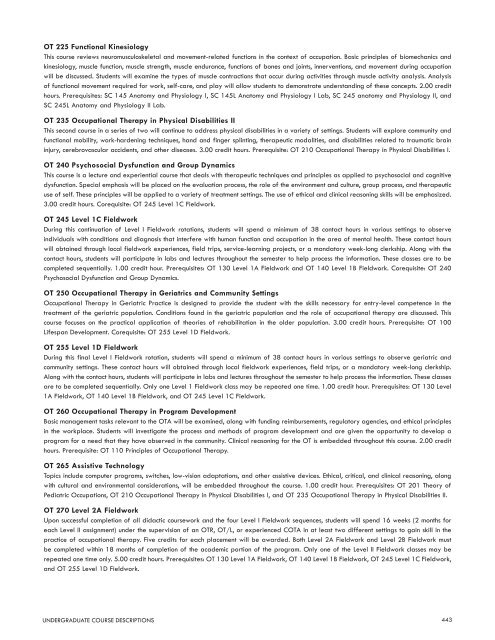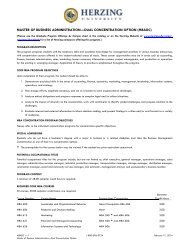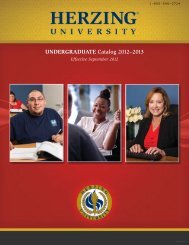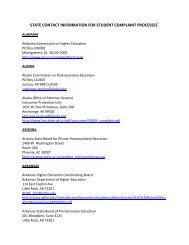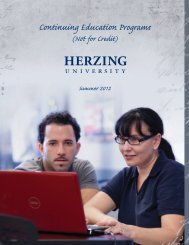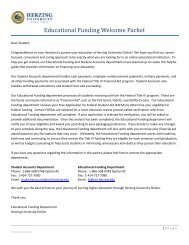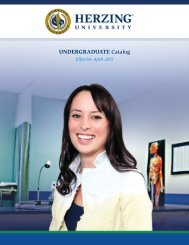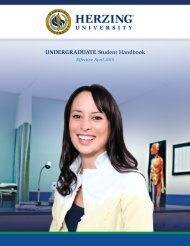Undergraduate - Herzing University
Undergraduate - Herzing University
Undergraduate - Herzing University
You also want an ePaper? Increase the reach of your titles
YUMPU automatically turns print PDFs into web optimized ePapers that Google loves.
OT 225 Functional KinesiologyThis course reviews neuromusculoskeletal and movement-related functions in the context of occupation. Basic principles of biomechanics andkinesiology, muscle function, muscle strength, muscle endurance, functions of bones and joints, innerventions, and movement during occupationwill be discussed. Students will examine the types of muscle contractions that occur during activities through muscle activity analysis. Analysisof functional movement required for work, self-care, and play will allow students to demonstrate understanding of these concepts. 2.00 credithours. Prerequisites: SC 145 Anatomy and Physiology I, SC 145L Anatomy and Physiology I Lab, SC 245 anatomy and Physiology II, andSC 245L Anatomy and Physiology II Lab.OT 235 Occupational Therapy in Physical Disabilities IIThis second course in a series of two will continue to address physical disabilities in a variety of settings. Students will explore community andfunctional mobility, work-hardening techniques, hand and finger splinting, therapeutic modalities, and disabilities related to traumatic braininjury, cerebrovascular accidents, and other diseases. 3.00 credit hours. Prerequisite: OT 210 Occupational Therapy in Physical Disabilities I.OT 240 Psychosocial Dysfunction and Group DynamicsThis course is a lecture and experiential course that deals with therapeutic techniques and principles as applied to psychosocial and cognitivedysfunction. Special emphasis will be placed on the evaluation process, the role of the environment and culture, group process, and therapeuticuse of self. These principles will be applied to a variety of treatment settings. The use of ethical and clinical reasoning skills will be emphasized.3.00 credit hours. Corequisite: OT 245 Level 1C Fieldwork.OT 245 Level 1C FieldworkDuring this continuation of Level I Fieldwork rotations, students will spend a minimum of 38 contact hours in various settings to observeindividuals with conditions and diagnosis that interfere with human function and occupation in the area of mental health. These contact hourswill obtained through local fieldwork experiences, field trips, service-learning projects, or a mandatory week-long clerkship. Along with thecontact hours, students will participate in labs and lectures throughout the semester to help process the information. These classes are to becompleted sequentially. 1.00 credit hour. Prerequisites: OT 130 Level 1A Fieldwork and OT 140 Level 1B Fieldwork. Corequisite: OT 240Psychosocial Dysfunction and Group Dynamics.OT 250 Occupational Therapy in Geriatrics and Community SettingsOccupational Therapy in Geriatric Practice is designed to provide the student with the skills necessary for entry-level competence in thetreatment of the geriatric population. Conditions found in the geriatric population and the role of occupational therapy are discussed. Thiscourse focuses on the practical application of theories of rehabilitation in the older population. 3.00 credit hours. Prerequisite: OT 100Lifespan Development. Corequisite: OT 255 Level 1D Fieldwork.OT 255 Level 1D FieldworkDuring this final Level I Fieldwork rotation, students will spend a minimum of 38 contact hours in various settings to observe geriatric andcommunity settings. These contact hours will obtained through local fieldwork experiences, field trips, or a mandatory week-long clerkship.Along with the contact hours, students will participate in labs and lectures throughout the semester to help process the information. These classesare to be completed sequentially. Only one Level 1 Fieldwork class may be repeated one time. 1.00 credit hour. Prerequisites: OT 130 Level1A Fieldwork, OT 140 Level 1B Fieldwork, and OT 245 Level 1C Fieldwork.OT 260 Occupational Therapy in Program DevelopmentBasic management tasks relevant to the OTA will be examined, along with funding reimbursements, regulatory agencies, and ethical principlesin the workplace. Students will investigate the process and methods of program development and are given the opportunity to develop aprogram for a need that they have observed in the community. Clinical reasoning for the OT is embedded throughout this course. 2.00 credithours. Prerequisite: OT 110 Principles of Occupational Therapy.OT 265 Assistive TechnologyTopics include computer programs, switches, low-vision adaptations, and other assistive devices. Ethical, critical, and clinical reasoning, alongwith cultural and environmental considerations, will be embedded throughout the course. 1.00 credit hour. Prerequisites: OT 201 Theory ofPediatric Occupations, OT 210 Occupational Therapy in Physical Disabilities I, and OT 235 Occupational Therapy in Physical Disabilities II.OT 270 Level 2A FieldworkUpon successful completion of all didactic coursework and the four Level I Fieldwork sequences, students will spend 16 weeks (2 months foreach Level II assignment) under the supervision of an OTR, OT/L, or experienced COTA in at least two different settings to gain skill in thepractice of occupational therapy. Five credits for each placement will be awarded. Both Level 2A Fieldwork and Level 2B Fieldwork mustbe completed within 18 months of completion of the academic portion of the program. Only one of the Level II Fieldwork classes may berepeated one time only. 5.00 credit hours. Prerequisites: OT 130 Level 1A Fieldwork, OT 140 Level 1B Fieldwork, OT 245 Level 1C Fieldwork,and OT 255 Level 1D Fieldwork.UNDERGRADUATE Course descriptions 443


